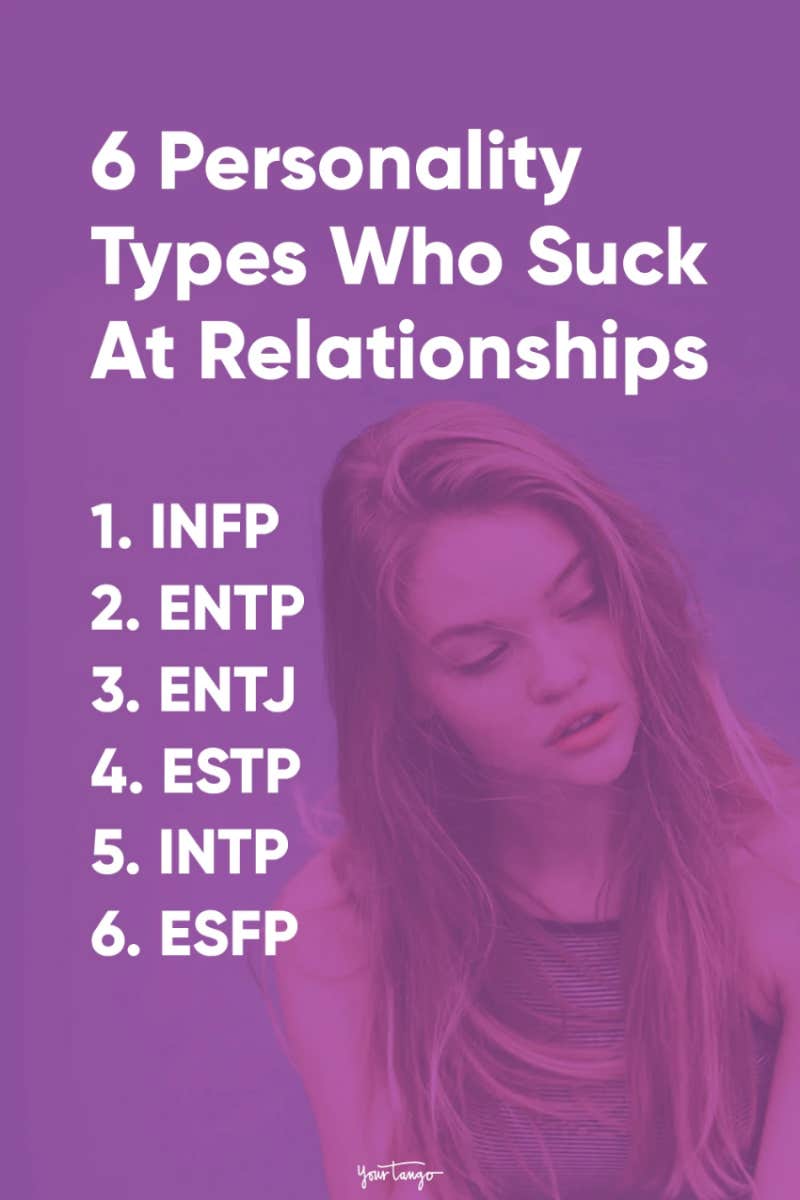6 Personality Types That Are Terrible At Finding (And Keeping) Relationships
Some personality types just don't excel in the romance department.
 Irzhanova Asel / Shutterstock
Irzhanova Asel / Shutterstock Not every single one of our relationships is going to work out in the long run. Unfortunately, breakups (as difficult as they can be) are a natural part of life. But they also aid us by bringing us closer to finding who we really should be with.
While everyone will probably have at least one relationship that ends, there are others who seem to be stuck in a never-ending cycle of them. The truth is that some of us just aren't great when it comes to relationships. It may sound harsh, but not all of us were born romantics.
And there are certain personality traits that contribute to us having unsuccessful romantic lives. Some personalities are just better at handling love and relationships than others are, and our Myers-Briggs personality types can give us a lot of information about how we handle romantic relationships.
Depending on what personality type a person has, there are particular quirks that may be holding them back from having a lasting, strong connection with another person. So, which personality types are more likely than others to end up in relationships that don't work out?
Here are the 6 Myers-Briggs types that are bad at relationships.
1. INFP (Introversion, Intuition, Feeling, Perceiving)
INFPs are hopeless romantics. They often will create a very specific image in their head of what the perfect relationship looks like and have a list of requirements sitting in their imaginations waiting for any possible romantic partners.
But no one can ever measure up to that ideal image they've created in their minds, and when an INFP starts whipping out those requirements, the real problems start.
INFPs don't realize that having these flawless standards for a relationship is completely wrong and can be very toxic. And this is where they always crash and burn when it comes to their romantic life.
An INFP's comparisons of the person they're with to what they've thought up as the perfect partner in their heads leads to serious conflict. However, this type tries to avoid conflict at any cost — even if that means the end of a relationship, which it often does.
2. ENTP (Extroversion, Intuition, Thinking, Perceiving)
ENTPs are big on personal growth and improvement, and this usually extends into their relationships as well. Because of this mindset they have, they often seem more like a boot camp instructor than a romantic partner.
They are driven by this need for constant improvement and can be very aggressive when it comes to this part of their personality. They have no problem pushing their partners to their limits, and can be very demanding and even sometimes competitive towards their partners.
ENTPs have a habit of wearing down their significant others fairly quickly, which usually is the reason why their relationships fizzle out.

3. ENTJ (Extroversion, Intuition, Thinking, Judging)
This Myers-Briggs personality is the kind that can have an extremely hard time holding onto a romantic relationship. Their alpha personalities often cause them to immediately assume the dominating role in a partnership.
In other words, they don't understand that it's called a partnership for a reason. This is because they tend to take relationships a little too seriously.
ENTJs are also guilty of making the harmful mistake of making decisions for both parties, including the decision of whether or not they deem the relationship to be one that's worthy of continuing long-term. They're quick to cut ties without even getting their partner's opinion.
They can be pretty ruthless when it comes to romantic relationships, and this is generally their downfall to having a successful love life.
4. ESTP (Extroversion, Sensing, Thinking, Perceiving)
The ESTP personality type is one of the most spontaneous. They like to live fast and have fun. Although this can make for exciting relationships, they are also short-lived.
An ESTP really never thinks about the long-term. This puts a huge obstacle in the way of their love life because they can never seem to move their relationships into a deeper, more meaningful place, which is crucial to having one that will last.
They also get bored very easily and tend to make impulsive decisions because of their boredom. And when they do get bored, an ESTP will waste no time moving on, often doing so at the expense of their partner's feelings, which isn't a strong point for them either.
5. INTP (Introversion, Intuition, Thinking, Perceiving)
Relationships rarely ever come easily for this type. The act of entering into a relationship is very difficult for an INTP as they can be extremely shy, and meeting new people is not one of their strong suits, so they usually wait for the other person to make the first move.
Navigating matters of the heart with this type can be pretty tricky. Once they do get into a relationship, they're loyal partners who take their couplings seriously.
However, it doesn't always seem this way to their partners. INTPs are infamous for lacking when it comes to the emotional part of a relationship. They have trouble expressing their own feelings and have no grasp of their partner's emotional needs, either.
People of this type are introverts who tend to always internalize their emotions, especially in romantic situations. They seem selfish in relationships because if they ever do express themselves, it will usually be whenever it suits them, instead of when they should address their partner's needs.
Another big relationship flaw the INTP personality type has is not placing importance on planning. They usually won't remember certain dates or other significant times that occurred in the relationship, which frustrates their partner.
They don't comprehend that things like date nights and other romantic social plans, little gifts, and surprising their partner can be a valuable part of having a good relationship. These are some critical weaknesses this type has a hard time overcoming in their relationships.
6. ESFP (Extroversion, Sensing, Feeling, Perceiving)
Relationships with an ESFP can be tough because they just can't seem to ever figure out what it is they really want. Their perception of what they want out of a relationship and life, in general, can change in the blink of an eye, causing confusion and even suspicion in their partners.
Partners can end up questioning an ESFP's integrity and wondering if they're mature enough to handle a serious relationship, which is actually true.
The ESFP personality type is fun and carefree, which carries over into their love lives — oftentimes a little too much. This type tends to view romantic relations as casual and fun. They don't plan for the future or work on building their relationships, which causes them to end up jumping from one relationship to the next.
Unfortunately, due to this, ESFPs tend to end up in dead-end relationships. They can also fall victim to people who intrude on their relationships. ESFPs can be greatly affected and influenced by their loved ones' opinions, and are sometimes easily persuaded by these opinions, even in regards to their romantic lives.
Sadly, an ESFP will even sometimes end a relationship because they care about the opinions of others over their partner's and their own opinions.
Sloane Solomon is a professional writer, editor, and former contributor to YourTango. She graduated from the University of Colorado with a Bachelors in English Writing, and has had her work published on Yahoo, MSN, and other outlets.

